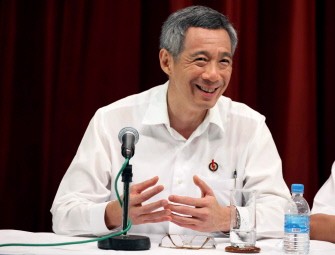SINGAPORE, May 9, 2011 (AFP) - Singapore's ruling People's Action Party (PAP) is seeking ways to reconnect with voters after its popularity plunged to the lowest point of its half-century rule, commentators said Monday.

Policies on housing, immigration, transport, income distribution and support for the poor -- the hot-button topics on which the opposition hammered the PAP before Saturday's vote -- are all expected to be reviewed.
The PAP, widely credited for leading Singapore to independence and prosperity, won 81 out of 87 parliament seats in Saturday's election but saw its share of the popular vote plunge to an historic low of 60 percent.
Only a system of group voting in which most members of parliament are elected in clusters prevented the opposition from gaining a total number of seats reflecting its 40 percent share of the votes cast.
Prime Minister Lee Hsien Loong called for "soul searching" within his party after its approval rating plunged in two successive elections -- in 2006, the PAP won 67 percent of the popular vote, down from 75 percent in 2001.
Its best showing was a whopping 84 percent in 1968, three years after his his father Lee Kuan Yew, who co-founded the PAP, led Singapore to independence.
While losing six seats seems minute by global standards, it is significant in Singapore because the PAP has been the dominant party for over 50 years and never lost more than four seats in any election.
"I think soul searching will benefit the party," said Reuben Wong, an assistant professor with the National University of Singapore's political science department.
He said the voters' message to the PAP was that "we know you are giving us economic growth but the wealth must be more equitably distributed; don't take us for granted."
The rise of social media platforms like Facebook, Twitter and Youtube as alternatives to PAP-controlled news media also stunned the politically conservative ruling party, which came under withering attack from young Singaporeans.
"I had come to believe that the PAP’s systematic use of fear as a strategy to silence critics was so successful that it had become a permanent feature of the Singapore political landscape," said Singapore's most famous writer Catherine Lim.
"Never again can I write about a population muted by fear, and its contemptible off-shoot, self censorship," she wrote in a blog.
Former prime minister Goh Chok Tong, who fared even worse than the party by getting only 57 percent of the votes in his district, said there was a "sea change in the political landscape... that tide was very strong."
Prominent socio-political blogger Alex Au said "the degree of frustration and cynicism among the electorate is now of such a level" that people will closely follow if Lee delivers on his promises of change.
"I think it will weigh on (PAP) minds that they cannot take for granted that ministers will be returned to power in future," he added in a blog.
The opposition's success in winning more support -- it never called for the PAP to be toppled -- came after it hit the party on gut issues, from rising costs and a sharp intake of immigrants to the widening income gap and the need to help the poor and senior citizens left behind by rapid progress.
"There is generally likely to be more attention focused on issues relating to the constraints to growth -- namely, housing affordability, the inflow of foreign workers and the quality of life for the 'sandwiched' middle income group," Barclays Capital economist Leong Wai Ho wrote in a commentary.
DBS Bank economist Irvin Seah said the poll outcome "could mark a shift towards policies aimed at sustainable and inclusive growth, and away from headline growth per se."
"Firstly, future budgets may focus more on income distribution to ensure that all Singaporeans benefit from growth," he wrote in a commentary.
























